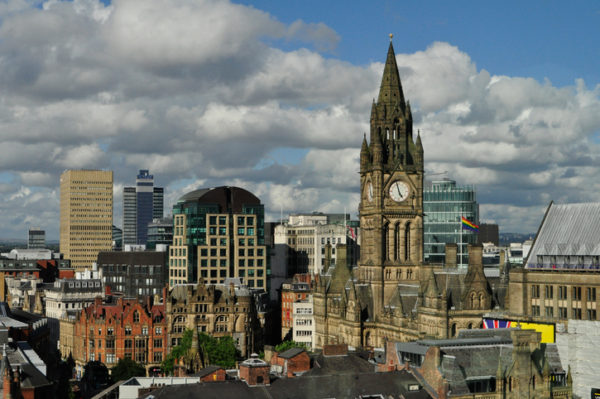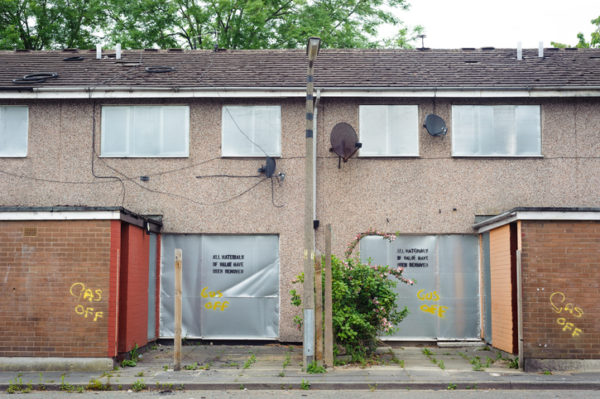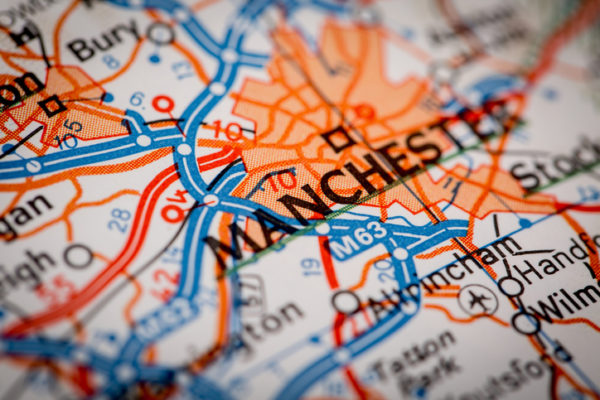Rethinking state-civil society relationships: is the new VCSE sector Accord a game-changer for Greater Manchester?
Alex Whinnom is Co-Investigator of Jam and Justice: Co-producing Urban Governance for Social Innovation. He is Chief Executive of the Greater Manchester Centre for Voluntary Organisation. In this blog, he reflects on the significance of a new Accord signed between the Greater Manchester Combined Authority and the Greater Manchester voluntary, community and social enterprise (VCSE) sector.

Civil society ought to be at the heart of good urban governance. The election of representatives to formal councils and leadership bodies is necessary but not sufficient for effective governance. Connecting these structures with civil society has the potential to involve citizens and communities at every level of granularity in thinking, designing and deciding on issues that affect them and on which they are knowledgeable. This leads to better decisions, creates ownership and enables commitment to the co-production of the resulting policies, services, functions, institutions and activities.
Greater Manchester is the largest of the regional core cities of England, with a population of 2.8 million, and an economy worth £60 billion. It has been at the forefront of the campaign for greater devolution from national government, and GM institutions now have direct governance of a wide range of responsibilities and associated budgets and are actively seeking more. A fourth “devolution deal” was agreed earlier this year, alongside the election of the first GM directly elected Mayor. This, along with a well-established culture of collaboration across sectors, geographies and political affiliations, makes Greater Manchester particularly well-placed to test a new approach to its VCSE sector.
A new Greater Manchester Strategy, Our People, Our Place, was launched on 27th October 2017. It sets out a vision for a city run for the benefit of its own citizens, supported by a productive economy, decent services and a flourishing environment:
- “A place where all children are given the best start in life and young people grow up inspired to exceed expectations.
- A place where people are proud to live, with a decent home, a fulfilling job, and stress-free journeys the norm. But if you need a helping hand you’ll get it.
- A place of ideas and invention, with a modern and productive economy that draws in investment, visitors and talent.
- A place where people live healthy lives and older people are valued.
- A place at the forefront of action on climate change with clean air and a flourishing natural environment.
- A place where all voices are heard and where, working together, we can shape our future.”
The Strategy is jointly owned by the Greater Manchester Combined Authority (GMCA) and for the first time, by other Greater Manchester public bodies, the Local Enterprise Partnership and Greater Manchester Centre for Voluntary Organisation (GMCVO). We are committed to work together to deliver it.
At the same time, a new Accord has been signed between the Greater Manchester Mayor and Combined Authority and the Greater Manchester voluntary, community and social enterprise (VCSE) sector:
“Greater Manchester is home to 16,000 voluntary, community and social enterprise organisations working to improve the lives of citizens. It is active across every aspect of growth and reform including crime and disorder; sport, culture and leisure; skills, employment and enterprise; health and social care; housing and transport; environment and carbon reduction; poverty reduction; inclusive growth and governance.
This GM VCSE Accord sets out a new agreement between the Greater Manchester Mayor and Combined Authority and the VCSE sector based on a relationship of trust. Our shared vision for the city-region is set out in the Greater Manchester Strategy Our People: Our Place – to make Greater Manchester one of the best places in the world to grow up, get on and grow old.
This Accord sets out a framework for the delivery of that shared vision and our commitment to reduce inequalities. We recognize this will only be achieved through new ways of working which are shaped and driven by our communities themselves with VCSE groups treated as equal partners with the public and private sectors. This is essential if we are to truly unlock the full potential of our citizens and communities…”
The signing took place at the GMCVO Annual General Meeting on 7th November 2017, and was formally approved by the GMCA on 24th November. Andy Burnham, Mayor of Greater Manchester, signed for the GMCA. More than a hundred Greater Manchester (GM) VCSE organisations, including most of the VCSE infrastructure (membership and support bodies), signed for our sector. A “portfolio lead” has been appointed by the Mayor to drive forward its implementation.
Why does this matter so much, how has it come about, and what will it achieve?
The new Accord matters for three reasons.
Firstly, Our People, Our Place is different from previous strategies. It is an attempt to rethink the economic strategy of the city region towards “inclusive economic growth”, and clearly recognises the interdependence of economic, social and democratic inclusion and the structural inequalities of the city region. The Accord acknowledges the centrality of the VCSE sector in such a strategy.
Secondly, there is formal and public recognition of partnership with the VCSE sector as being just as significant as the business sector, and of the need for co-design, co-ownership and co-delivery. The public-facing documents are the outward expression of mature multi-sectoral relationships and an understanding that citizen-led voluntary action is vital to successful delivery of the Strategy.
Thirdly, and perhaps most significantly, leadership and governance seem to be changing and developing to become more inclusive and collaborative: on the public side, initiatives like LeadingGM, the visibility of the Mayor and increased open-ness from many public sector executives; on the VCSE side, an emergent well-networked movement of people with consistent positions, willing and able to lead beyond their organisations.
This has come about in a wider context, driven by both negative and positive factors.

Despite a strong economy, inward investment and well-funded public services, inequalities in Greater Manchester have not reduced over 40 years. Whatever we were all doing – politicians, business, public institutions and our own VCSE sector – was not adequately addressing the causes of the problem. Since 2011 we have been experiencing increasing inequalities and rising poverty alongside eye-watering cuts to public funds. The economy is still doing well, but this is not necessarily benefitting Greater Manchester citizens. The reduction in the numbers of people claiming welfare benefits does not equate to increased employment in decent jobs, and certainly not to increased productivity. Our fast-growing food bank sector (from two to 70+ in seven years) is heavily patronised by working families. In some parts of the city region there has been no recovery from loss of industry a century ago and the northern boroughs are particularly under-developed. This is acknowledged by city-region elected leaders, and cuts to public funding have created a situation where it has become less risky to take risks than to continue in the same direction.
On the positive side we have devolution – arguably not yet enough devolution to give our city region the power to develop like comparable cities internationally, but more than anywhere else in England and certainly more than enough to do some things better. We have a strong and established culture of collaboration across geographies, sectors and party politics, on a footprint small enough for people to form trusting personal relationships. And we have a secret weapon in the form of a growing, resilient, adapting, innovative, well-networked citizen-led VCSE sector with strong distributed leadership, much of which is up for the challenge of a mature partnership with the public and business sectors.
As city-region leaders all of us have been thinking for some while – about inclusion; equality; governance; economic models; place; the role of voluntary organisations, community groups, social enterprises, co-operatives and non-profits; ethical business; social value; and co-production.
The result is that as a city region, Greater Manchester is well-placed as the site of an experiment in inclusive socio-economics driven by a new culture of inclusive governance and co-production and with the VCSE sector at its heart.

Into this setting, we have placed the Jam and Justice project. Jam and Justice is itself an experiment in applying co-production principles. It is a partnership between three universities and GMCVO, the intention being to draw on the knowledge and experience of academic practitioners with different specialisms and also on the connections and experience of GMCVO. The partners are working with a collective of citizen researchers including from the VCSE sector. This Action Research Collective (ARC) has formed small teams to undertake a range of projects exploring areas and methodologies for achieving more inclusive governance. Jam and Justice is supported by the GM Combined Authority elected and executive members, who are keen to implement its findings.
Jam and Justice is thus an important, well-placed, well-supported and very well-timed initiative to test the concepts of inclusive governance and the practical methodologies of co-production in real time against live issues in a context in which there is a positive attitude to innovation in governance and a genuine commitment to inclusion. Many of the projects being undertaken by the ARC link directly to the Greater Manchester Strategy implementation plan and the ambitions of the Accord.
If the Accord is fully implemented, I would expect that by the end of 2020 we would see:
Governance changes:
- Accountable VCSE representatives embedded at every level of city-region and locality governance.
- A consistent approach to tackling our biggest socio-economic problems by forming multi-sectoral alliances and drawing on the expertise and knowledge of the “owners” of the problems.
- The consistent involvement of relevant VCSE organisations and citizens in developing strategies and action plans, following principles emerging from Jam and Justice.
Changes in the VCSE sector:
- A clear co-produced strategy for stimulating the growth and development of the VCSE sector – aka the “social economy” – backed by increased investment of public money.
- An increase in active networks of VCSE and other organisations within communities, including our more deprived neighbourhoods.
- Increased volunteering.
Changes in the economy:
- Wide comprehension and support for creating social value alongside economic returns.
- Evidence of growth in social and community enterprise, community business and mutual sectors, closely linked to traditional business.
- Some green shoots indicating bottom up economic growth and social capital in our most deprived areas driven by citizen-led social enterprise and volunteering.
The signing of the Accord is important. It is hugely symbolic and could be a game-changer for the city-region. We will know within two or three years whether this is the case.
Jam and Justice is funded by the Economic and Social Research Council and Mistra Urban Futures. It is led by the Universities of Sheffield, Manchester and Birmingham and the Greater Manchester Centre for Voluntary Organisation. Contact alex.whinnom@gmcvo.org.uk or b.perry@sheffield.ac.uk and follow us on @JamandJustice